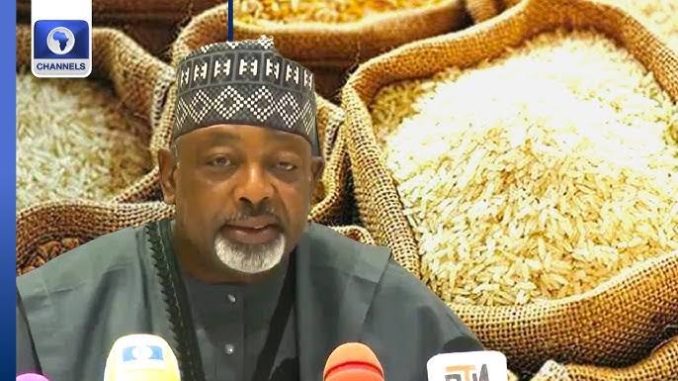
In a bid to boost the health of Nigerians, the Federal Government and HarvestPlus, Monday, released first Zinc Rice varieties of Faro 71 and 72 to tackle Zinc deficiency among Nigerians.
This was made known by the Minister of Agriculture and Food Security, Sen Abubakar Kyari, along with the Country Manager, HarvestPlus, Dr Yusuf Dollah Fouad at the Ministry’s headquarters in Abuja.
Kyari described the Zinc fortified rice as first of its kind in Nigeria and Africa and a game-changer for the food system and health of Nigerians.
He also noted that Zinc deficiency has been a serious public health issue in the country, contributing to poor nutrition outcomes, especially among women and children.
He said: “Zinc is a vital micronutrient required for immune function, growth, cognitive development, and overall well-being. Yet, a large proportion of the Nigerian population does not meet their daily zinc requirements due to diets that are predominantly low in bioavailable micronutrients.
“According to national nutrition surveys and global health reports: Anemia affects about 68% of children under five in Nigeria, with zinc and iron deficiencies being major underlying causes.
The national stunting prevalence among children under five in Nigeria is 37%. Proper nutrition is essential for the survival of the human race, as the future of our generation is dependent upon our children.
“Zinc deficiency weakens immune systems, increasing the risk of infections, stunted growth, and delayed development in children.Inadequate dietary intake of zinc contributes to maternal health issues, poor birth outcomes, and reduced work capacity in adults.
“To address this, Nigeria is taking proactive steps by introducing biofortified, zinc-enriched staple crops, such as zinc rice, offering affordable, accessible solutions to improve dietary zinc intake and strengthen food and nutrition security.
“Through a strategic collaboration between HarvestPlus, HarvestPlus Solutions, the Federal Ministry of Agriculture & Food Security, and the National Cereals Research Institute (NCRI), Nigeria has achieved a historic milestone with the release of Faro 71 and Faro 72 — the first biofortified, zinc-enriched rice varieties in both Nigeria and Africa.
“This remarkable achievement was made possible through the support of the Foreign, Commonwealth & Development Office (FCDO) of the British Government, the Propcom+ Project, and the Alliance for a Green Revolution in Africa (AGRA), whose innovative funding for agricultural development in Nigeria has been instrumental in making progress a reality.
“This breakthrough builds on successful scaling efforts in Bangladesh and India, where farming households growing zinc-enriched rice have recorded measurable improvements in nutrition outcomes through increased production and consumption.
“Faro 71 and Faro 72 address key challenges in rice production and significantly contribute to food and nutrition security for Nigeria’s smallholder farmers, who depend on rice for both sustenance and income. These varieties not only offer higher zinc content and yield but also climate resilience such as: adaptability to Savanna and rainforest ecologies drought tolerance pest the and disease resistance.
This makes them a valuable tool for enhancing both the productivity and resilience of rice farming systems in vulnerable communities.”
Meanwhile, the Minister, assured that, “The Federal Ministry of Agriculture and Food Security and HarvestPlus will continue to work with a coalition of the willing, alongside public institutions, private companies, and national partners to promote the widespread adoption and scaling of these nutri-cereals, driving a rapid, nutritious transformation of the Nigerian food system.”
Also, the Country Manager, HarvestPlus, Dr Yusuf Dollah Fouad, explained that, “As an affordable, accessible dietary source of zinc, these enriched rice varieties can meet up to 40 per cent of daily zinc requirements when consumed regularly, making them a practical and proven solution to combat zinc deficiency and improve cognitive health, especially, among adolescents.
“Beyond its nutritional benefits, zinc-enriched rice offers sustainable, innovative market opportunities for smallholder farmers, helping them improve their livelihoods while supplying healthier, nutrient-dense food to Nigerian and African consumers.
“HarvestPlus will continue to work with a coalition of the willing, alongside public institutions, private companies, and national partners to promote the widespread adoption and scaling of these nutri-cereals, driving a rapid, nutritious transformation of the Nigerian food system.
“We we are going into the commercialization phase to ensure that our seed companies who are business entities, saddled with the responsibility of multiplying and selling seeds, they have access to the early generation seeds, and as well as within rural communities.
“We are also going to run what we call the community seed enterprise of production, where rural people are empowered to produce their own seeds. So, this is the phase we are going into.
“We are already collaborating with the National Series Research Institute to produce the early generation seeds, and maybe in the next three or four months, the early generation seed varieties will be ready, and we are going to massively integrate the Nigerian seed companies so that they can take the technologies and move ahead with it, multiply, sell, so that our farmers are able to have access to also grow into grains that they will consume, and also sell and make money from it.”
Also speaking was the Country Representative Propcom+, Dr Adiya Ode, who said said it is imperative for commercialization of Zinc Rice seeds be closer and available to farmers.
“Just to reiterate the fact that we will be working very closely with Harvest Plus to ensure that these seeds are commercially available and as close to the farmers as possible.
“We will be working with seed companies who will even be reproducing the seeds, multiplying the seeds in the local areas where the farmers are so that it is easily accessible, they don’t have to travel far, there is no premium being placed on those seeds”, she added.

